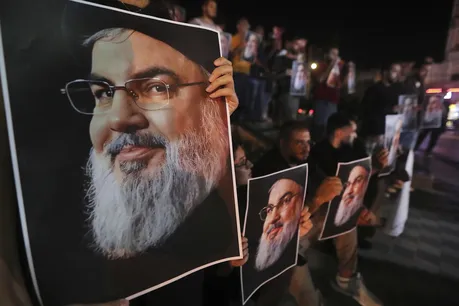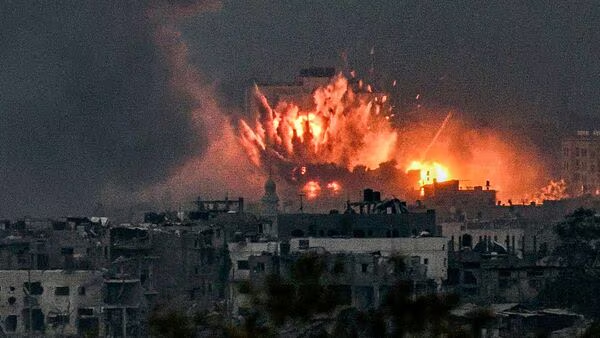Hezbollah Leader Hassan Nasrallah Killed in Israeli Air Strike
In a significant escalation of conflict, Israel’s military announced the killing of Hezbollah leader Hassan Nasrallah in an air strike on Beirut on Friday evening. This development marks a pivotal moment for the militant group and its backer, Iran, especially following days of intense hostilities.
Hezbollah has since confirmed Nasrallah’s death at the age of 64, validating earlier claims made by the Israel Defense Forces (IDF). The news has prompted widespread speculation regarding Hezbollah’s next moves. In response, the group has vowed to continue its struggle against Israel, reiterating their fighters’ commitment to their cause.
Iran’s supreme leader, Ayatollah Ali Khamenei, echoed this sentiment, reinforcing the group’s resilience and determination in the face of this critical blow. As tensions rise, the implications of Nasrallah’s death on regional stability and ongoing conflicts remain to be seen.
Israeli Prime Minister Benjamin Netanyahu stated that Israel has “settled the score” with Nasrallah’s assassination, emphasizing that the air force’s bombing campaign will continue. This high-profile strike not only represents a significant blow to Hezbollah but also escalates tensions in the region, raising questions about the potential for further violence and retaliation from the group.
Is the Killing of Hassan Nasrallah a Game Changer?
The recent assassination of Hassan Nasrallah, the long-time leader of Hezbollah, in an Israeli airstrike has sent shockwaves through the Middle East. Having led Hezbollah for over three decades, Nasrallah transformed the group into a formidable military and political force. His death marks a pivotal moment that could significantly alter the landscape of the ongoing conflict.
another resource Bloomberg

A New Chapter in the Conflict
The airstrike, which targeted a densely populated suburb of Beirut, has heightened tensions in the region. Israel is on high alert, with officials stating they are prepared for various potential responses from Hezbollah. The real question now is how Hezbollah will react. Will they escalate their military actions, or will they seek to consolidate their power in response to this critical loss?
As speculation swirls, it’s clear that Nasrallah’s killing is likely to reshape Hezbollah’s future and its role within the broader geopolitical context. Analysts are closely monitoring the group’s next steps, as a strong response could ignite further violence and instability in an already volatile region.
Reactions in Israel
In Israel, the mood is markedly different. Political analyst Ori Goldberg reports a sense of excitement among the Israeli populace, particularly among those supportive of the government’s military policies. “There is a broad consensus that supports war, and many Israelis feel giddy about the assassination of Hassan Nasrallah,” he explained. This sentiment is fueled by the belief that Nasrallah’s death could signify a turning point—not just against Hezbollah but in the larger struggle against perceived tyrannical regimes across the region.
Goldberg highlights that support for Israeli Prime Minister Benjamin Netanyahu’s administration has reached new heights, arguably the highest since the onset of the recent conflict. Many Israelis envision a “new beginning” in the Middle East, where oppressed populations might rise against their rulers. However, Goldberg cautions that Netanyahu’s actions are more politically motivated than focused solely on security.
“The truth is, he has very few options,” Goldberg noted, emphasizing that Israel is unlikely to engage in a full ground invasion of Lebanon. Instead, he anticipates “a few more days of concentrated Israeli bombing” that would allow the government to claim a successful operation while avoiding deeper entanglement.
Regional Responses
The assassination of Nasrallah has triggered reactions beyond Israel. A rocket fired from southern Lebanon recently landed in Jordanian territory, though it caused no casualties or damage. This incident highlights the potential for spillover effects and further complications in an already precarious regional situation.
U.S. President Joe Biden, when asked about the possibility of an Israeli ground incursion into Lebanon, called for an immediate ceasefire. “It’s time for a ceasefire now,” he stated, emphasizing the urgency of de-escalating tensions. Biden’s comments reflect a growing concern among international leaders about the ramifications of this conflict on regional stability and global security.

United Nations Secretary-General Antonio Guterres also weighed in, urging all parties to “step back from the brink” of an all-out war. His spokesperson reiterated the need for both sides to recommit to the 2006 UN Security Council resolution that ended the previous Israel-Hezbolla conflict, calling for an immediate cessation of hostilities.
What Lies Ahead for Hezbollah?
As Hezbollah grapples with the loss of its leader, the group’s internal dynamics may shift. Nasrallah was a unifying figure, and his absence could create a power vacuum or lead to infighting among the group’s ranks. Analysts are also questioning whether the younger generation of Hezbollah leaders will adopt the same strategies and rhetoric that characterized Nasrallah’s leadership.
The group has vowed to continue its resistance against Israel, but the effectiveness of their response remains uncertain. If Hezbollah chooses to retaliate aggressively, it could lead to a significant escalation in violence, drawing in regional powers and potentially igniting broader conflicts.
other resources for this article – Aljazeera
Conclusion
The killing of Hassan Nasrallah is undoubtedly a watershed moment in the ongoing conflict between Israel and Hezbollah. As both sides prepare for potential repercussions, the stakes have never been higher. The international community is watching closely, aware that the next moves could determine the future of Lebanon and the broader Middle East.
In this intricate web of political maneuvering, the balance between action and reaction will be crucial. Whether this assassination will truly be a game changer or merely another chapter in a long history of conflict remains to be seen. As tensions mount, one thing is clear: the ramifications of this event will resonate far beyond the borders of Lebanon.
click for another topics
Thanks for reading.%title% %sep% %sitename%












Great breakdown! It’s refreshing to see poker strategies analyzed with such depth. For those looking to diversify their gaming, checking out platforms like Jili Online can offer new ways to test decision-making skills under different scenarios.